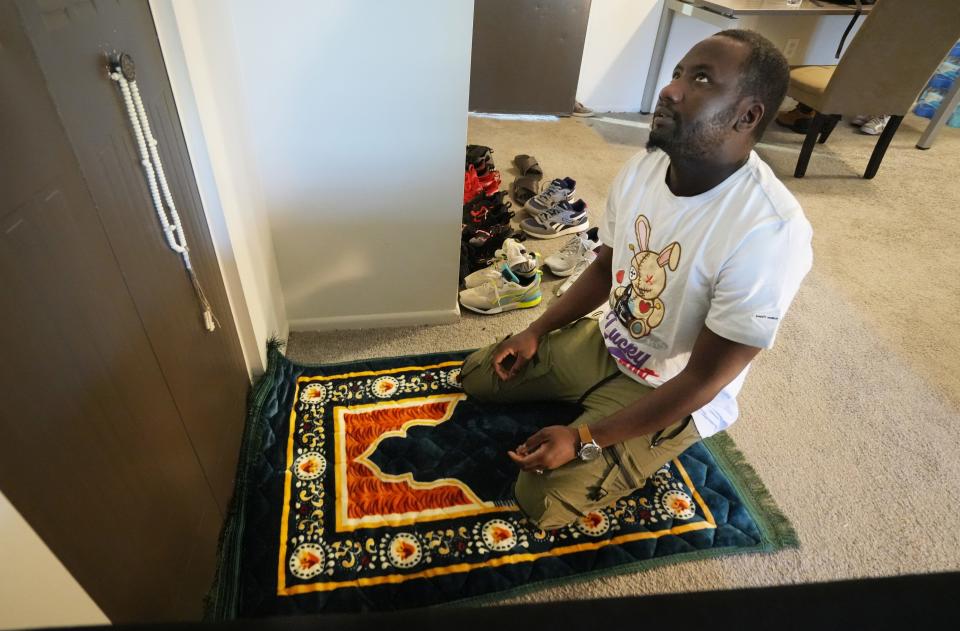New book shares experiences of over 250 Mauritanians, others deported from Ohio

A new book examines the experience of deportation from the perspective of the individuals deported, as well as loved ones they left behind in Ohio and elsewhere in the U.S.
“Broken Hope: Deportation and the Road Home” is based on interviews with over 250 deportees, as well as family members, conducted by Maryam Sy, an organizer at the Ohio Immigrant Alliance (OHIA). Most of the interviewees were Mauritanians deported from Ohio, but they also included people deported from other states to elsewhere in Africa, Latin America, the Caribbean and Asia.
The book is authored by OHIA Director Lynn Tramonte, based in Cleveland Heights, and Suma Setty, a senior policy analyst at the Washington-based Center for Law and Social Policy.
In an interview with The Dispatch, Tramonte said the research grew out of organizing work that OHIA conducted in the wake of rising deportations of Mauritanians from Ohio from 2018-2020.
For many years, the U.S. had deported few people to Mauritania because the country’s government refused to recognize the citizenship of many Black citizens — some of whom were enslaved. But deportations of Mauritanians rose after the Trump Administration changed policy to classify every undocumented immigrant as a priority for deportation, instead of a prior policy prioritizing criminals and people deemed a national security threat.

Deportation can happen after an immigration court rejects an undocumented person’s asylum or other claims. Supporters of deportations argue they are necessary to deter illegal immigration and contribute to public safety.
But Tramonte and Setty argue in the book that deportation can be an extreme punishment for people who have spent decades living, working and raising families in the U.S.
Forty-three interviewees were parents of U.S. citizens, and 110 had family in the U.S., according to the book. On average, they had lived here for 17 years. Many faced continued persecution in their countries of birth after being deported, they said.
The following Q&A with Tramonte, Setty and Sy has been edited for length and clarity.

Question: How have deportation numbers varied over recent presidential administrations?
Suma Setty: Deportations really skyrocketed during the Obama administration, actually. And they started to scale down at the end of the Obama administration … (after) they issued guidelines to prioritize certain people for deportation — people who pose a threat to national security is one of those criteria. These are administrative priorities and are reversible. … Under Trump, basically anyone who was living in the in the U.S. without documentation was eligible for deportation…
The Biden administration reinstituted guidelines to prioritize the detention and deportation of folks who pose a national security threat. But those guidelines are pretty vague and subject to interpretation by local immigration authorities.
Q: Why did you undertake this project? Were people willing to share their stories with you?
Setty: Much of the (previous academic) research has focused on the impacts of (deportation) on the people left behind, like children in the United States, spouses or their family. … To hear straight from the people who have been deported is something very unique.
Maryam Sy: We started with 75 people. And then at the end, we had over 255 people that I interviewed. … The interviews were 100% by phone and WhatsApp.
The majority were Muslim men, Black men, and they're not used to talking about emotions. At the beginning, it was hard for them to open up and tell me their stories. … But little by little, they opened up to me. I think it helped that I'm speaking their language and the fact my husband is Mauritanian, the fact that I'm a Black woman, and I'm an immigrant in America.
Q: Different chapters are organized around the different ways that deportees and their families are affected by deportation. What are some of those ways?
Lynn Tramonte: It's really not an option for many families to be together — they have to be separated. With the Keita family from Cincinnati, Ibrahima was deported to Mali, where there's been a coup. One of his children has sickle cell anemia, and his treatment’s not available (in Mali). So if the young boy were to move to Mali to be with his dad, he would literally die.
There’s (a chapter) about children being put into adult roles (following deportation of a parent). … Children in their early teens to later teens (are) suddenly having to be responsible for household maintenance, sometimes leaving school to work to support the family because of the loss of the income of the parent.
Sy: One of the people I spoke to, Abdoulaye Lam, from Columbus, was in the U.S. for around 20 years. He and his wife were both asylum seekers. He was working at Chase Bank, reporting regularly to ICE check-ins every time. Then on one check-in, he was arrested and detained. His wife was pregnant. She had to give birth alone. … She went to see him one time before he was deported, but he never got to hold his baby, Mohammed. And then Abdoulaye was deported to Mauritania. But he can't live in Mauritania because Mauritania is a very racist country towards Black people. … Mohammed was 6 years old before he was able to go and see his father in Senegal.
Setty: I come from a public health background, and one of the frameworks we use is called “adverse childhood experiences,” or ACEs. These are known to be linked to later conditions like chronic health (problems), shorter telomeres, aging, lower life expectancy and decreased ability to be self-sufficient. It hasn't formally been framed in this way, but I do think that deportation of a parent could count as an ACE.
The book is available for free download at www.reunite.us/read.
Peter Gill covers immigration, New American communities and religion for the Dispatch in partnership with Report for America. You can support work like his with a tax-deductible donation to Report for America at:bit.ly/3fNsGaZ.
This article originally appeared on The Columbus Dispatch: Q&A: New book follows over 250 Mauritanians, others deported from Ohio
